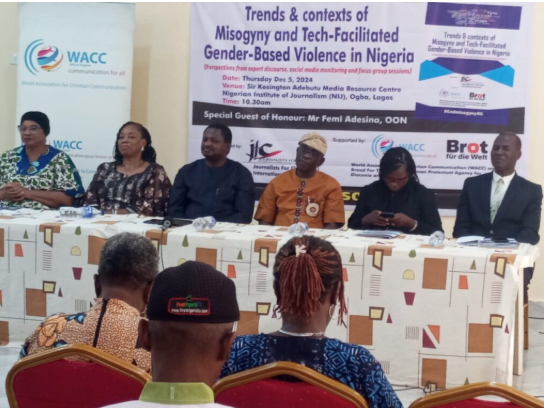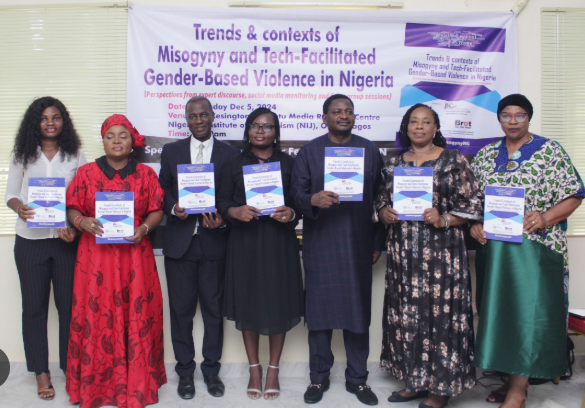By Helen Okechukwu, JKNewsMedia Reporter
In a setting brimming with seasoned journalists, eager students, and advocates for gender equity, a profound conversation unfolded about the pervasive issue of gender-based violence and misogyny in Nigeria.
Misogyny, in a layman’s language, is a deep dislike, prejudice, or unfair treatment toward women simply because they are women.
This can show up in different ways, like treating women as less capable than men, making mean comments about them, or limiting their opportunities at work or in society.
It can also lead to harmful actions, such as violence or abuse, either in person or online. In essence, misogyny creates inequality and makes it harder for women to live freely and safely.
The event, held at the Kessington Adebutu Media and Resource Centre, Nigerian Institute of Journalism, Lagos, the public presentation of Trends and Contexts of Misogyny and Tech-Facilitated Gender-Based Violence in Nigeria, drew attention to one of society’s most persistent challenges.

Mr. Femi Adesina, a respected journalist and former Special Adviser on Media and Publicity to ex-President Muhammadu Buhari, passionately addressed the audience as the Special Guest of Honour.
His central message was clear: any form of discrimination against women is both ungodly and a disservice to humanity.
He emphasized that women, created in God’s image, deserve respect and equality in all spheres of life.
Reflecting on the report by Journalists For Christ International Outreach (JFC), Adesina lauded the organization for shedding light on the troubling rise of online violence against women.
He stated, “This research reveals another face of gender violence—digital abuse. It’s disheartening to see women treated with disdain, whether online or offline.
The Lord gave the word, and great is the company of those who publish it. Awareness must spread, for it is unholy to despise women.”
He warned against frustrations leading to extreme responses, referencing Western trends advocating for same-sex marriages as a consequence of unresolved inequalities.
The report was a collaborative effort sponsored by the World Association for Christian Communication (WACC) and Bread for the World, highlighting various forms of tech-facilitated gender-based violence (TFGBV) prevalent in Nigeria.
Attendees, including journalists, human rights activists, and students, engaged in vibrant discussions on the findings and their implications.
Mr. Gbenga Adefaye, Provost of the Nigerian Institute of Journalism, commended JFC for its advocacy-driven initiatives.
Sharing his experiences, he said, “In my career, I see individuals, not genders. Some of the finest journalists I know are women who excelled in their craft. Ignorance drives discrimination against women. We need to recognize and support their immense contributions across all fields.”
Mrs. Oruoma Odum, a lecturer at NIJ who reviewed the report, delved into the societal roots of misogyny. She noted that family upbringing plays a crucial role in shaping attitudes toward gender.
“Parents must teach boys to respect girls. Education is key to fostering a society where equality thrives,” she said.
Odum also emphasized the government’s responsibility, stating, “The government has the knife and the yam; they must act decisively to combat misogyny and gender violence.”

Other speakers, including Pastor Tokunbo Emmanuel, Ms. Betty Abbah, and Yinka Fayemi of the Nigeria Association of Women Journalists (NAWOJ), echoed these sentiments.
They highlighted the emotional, psychological, and physical abuse many Nigerian women endure due to societal stereotypes.
The speakers urged women to resist societal pressures and encouraged collective action to challenge ingrained biases.
The event also reflected on JFC’s longstanding commitment to advocacy and media-based interventions. Mr. Lekan Otufodunrin, President of JFC, shared a touching account of the organization’s journey.
“Our relationship with WACC began during my visit to the United Kingdom (UK) in 1999. Over the years, their support has enabled us to undertake impactful projects like this,” he remarked, expressing gratitude to sponsors and contributors.
On the overall, the atmosphere was one of shared determination to foster change.
Also, the report not only highlighted the grim realities of misogyny and TFGBV but advocates also called for proactive measures from individuals, families, and institutions to build a society where every individual, regardless of gender, is treated with dignity and respect.





